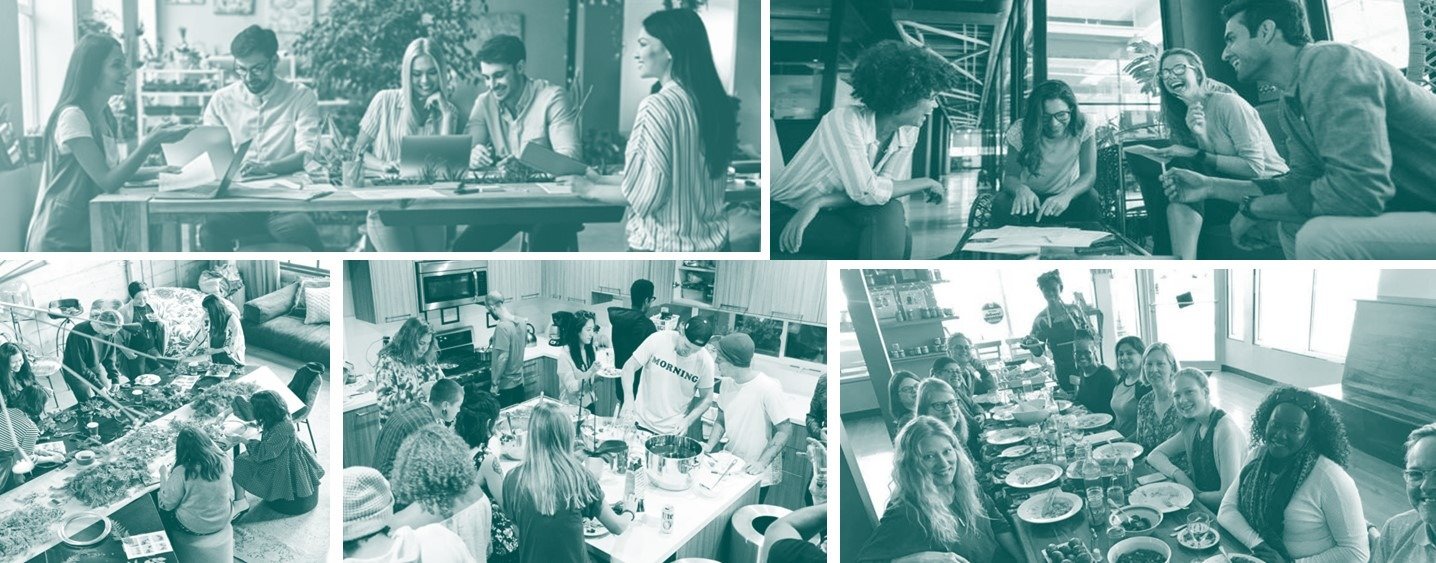
sharing, stimulation, security & support
As a style of social relationship, communal living designed around sharing domestic facilities and equipment, is by no means a modern concept. It is as old as the caveman clans and continues to be demonstrated as mankind’s most instinctive social, domestic and resource sharing order, by not only traditional cultures, but is also gaining significant traction across urban and suburban as well as rural communities, the world over.
In contrast, living divided within walled-off isolated, resource access-restricted, suburban and apartment micro-kingdoms, is only a relatively new arrival on the human habitat structuring timeline.
Perhaps instinctively or born out of necessity in our present day, more and more people of varying age ranges and cultural backgrounds, as well as, socio-economic advantage and disadvantage are abandoning the old paradigm of working jobs they hate in order to save for a deposit to qualify to saddle themselves with 25-40years of mortgage-debt. Over the past 10 to 15 years growing numbers within the working age population have turned away from chasing the conventional ‘Dream Lifestyle’ of a house in the suburbs, or else a compact apartment in a trendy downtown city area.
In its place, an increasing number of young adults moving out of home, or else completing higher education, along with the droves of empty-nesters are lining up to embrace co-living.
For those who are prepared to realistically and rationally face up to the social, economic and environmental challenges of the 21st Century, sharing the space where they live, work and play, reveals itself as ‘making perfect sense’. Since the beginning of life on earth, both animals and humans have clustered together for protection, share skills as well as pool resources and basically hang out together.
It appears instinctual that most of us are more comfortable, creative, relaxed and content when we are part of the larger herd.
That’s what makes society – society. Essentially, we all share the roads, water, air, footpaths and byways, as well as beaches and sand. For now, access to all of these is free. However moving forward? That’s up to all of us to decide what constitutes a fair and sustainable society.
Aligning Lifestyle & Love-style with the Sharing Economy
Many think that the ‘Sharing Economy’ is a new thing, a made up ‘pie in the sky’ concept – a trendy buzz word that has little chance of ever becoming a reality. However, nothing could be further from the truth. It is in fact happening all over the planet. Some economic analysts suggest that the sharing economy is currently worth an estimated 60 billion dollars. The conservative forecast is for the Sharing economy to grow to more than 100 billion in the next few years.
As people become more aware of the disastrous effects of climate change, the need to waste not, want not, has led to groups coming together to pool, recycle and repurpose everything from clothing to cans. Certainly the Sharing Economy didn’t come into being overnight. We have been a long time at it, trying to overturn the ‘consumption’ era that run riot from the end the 2nd World War and grew massive momentum throughout the 50’s to our present era.
Right now masses of the global population are in recovery mode. The addiction to conspicuous consumption has been outed and seen for what it is – a replacement for social connection, creative expression and ecological relationship. We have all been so divided and conquered. Many of us see that now and we are waking up to a new day, a new era of putting planet, people and peace first. Thus a critical mass is emerging, ready willing and able to take on the responsibility of steward nature’s finite resources.
Rearranging our domestic cohabitation facilities around sharing everything from the most efficient long-drive electric car in the garage, to installing a methane gas generator that recycles 100% of our household and sanitation waste is a trend that is here to stay. As more and more of the global population catches hold of the global warming ‘ticking time bomb’ in their backyards, the more fervent clean green infrastructures are demanded and commissioned. Electric cars are on our doorstep waiting to be taken up. Methane Gas generators stand at the ready to make obsolete poisonous ‘fracked’ gas extraction.
Smaller to zero, and even positive eco-footprint living is possible. The technology exists. All it takes is coming together and organising our daily living in such a way that the best of the best of clean, green facilities and equipment that make like pleasurable, secure and sustainable, can be shared. If we share skills and pool our time and money, certainly we can afford the retro fit entire neighbourhoods – set up organic aquaculture grow tunnels within the space of shared backyards. Tear down the fences that prevent sharing and begin to build a local shared economy. It is easy as with a little ‘know how’.
Play The Future Forward
Group living centred around ‘access’ rather than ‘exclusive ownership’ of the kitchen sink and everything in between, now has a roadmap. Through the Play the Future Forward Workshops, people of all age ranges, cultures and backgrounds are coming together to think, dream and implement the necessary changes to their lifestyle to access more clean green organic food, zero eco-footprint secure living space as well as develop sustainable income through the development of eco-cooperative enterprise. Evolved Lifestyles based on sharing and caring are germinating – pushing through the ground where they were consciously and intelligently planted and growing into viable options for people to live quality purposeful lives.
Participants who pass through the workshops no doubt go onto become richer in both monetary terms and also enriched by adding cooperative supportive relationships to their lifestyles.









